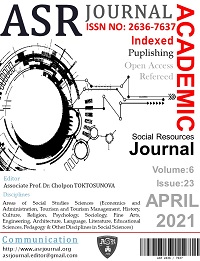2011-2019 YILLARI ARASI TÜRKİYE’DE ORGANİZE VE NİTELİKLİ DOLANDIRICILIK SUÇLARININ EKONOMİ VE AİLE KURUMLARI AÇISINDAN DEĞERLENDİRİLMESİ
Author :
Abstract
Organize ve nitelikli dolandırıcılık suçlarının failleri ekonomik çıkar amacı gütmekte ve hileli davranışlarla insanların zafiyetlerini kullanmaktadırlar. Bu türden suç organizasyonları; haksız kazanç elde edilmesi, gelir adaletsizliği, yoksulluk, bürokratik işlerin sekteye uğraması, ailelerin parçalanması gibi toplumu derinden etkileyen sosyal sorunların tetikleyicisi olmuştur. Bu çalışmanın amacı, 2011-2019 yılları arası Türkiye’de organize ve nitelikli dolandırıcılık suç verilerinin ekonomi ve aile yapısı açılarından sosyal bütünleşme ve çözülme bağlamında analiz edilmesidir. Bu amaçla 2011-2019 yılları arasında Emniyet Genel Müdürlüğü’nün yayınlamış olduğu suç istatistikleri incelenmiş olup nicel ve nitel analizler yapılmıştır. Çalışmada hem organize suç hem de nitelikli dolandırıcılık suçu ele alınmıştır. Araştırma bulgularına göre organize suç ve nitelikli dolandırıcılık operasyonları daha çok ekonomik olarak gelişmiş ticaret ve sanayinin yoğun olduğu illerde yapılmaktadır. Her iki suç türünde yaş olarak 31-45 yaş aralığı, eğitim olarak ise ilköğretim seviyesi yoğunluk göstermektedir. Bu türden suçların yaygınlığı mikro ve makroekonomik yapıyı bozmakta ve aile yapılarını olumsuz etkilemektedir.
Keywords
Abstract
The perpetrators of organized and qualified fraud crimes pursue economic gain and exploit the weaknesses of people with fraudulent behavior. Such criminal organizations; It has been the trigger of social problems that deeply affect the society, such as gaining unfair income, income injustice, poverty, interruption of bureaucratic work, and the disintegration of families. The purpose of this study is to analyze the datum of organized and qualified fraud from the perspectives of economy and family structure in the context of social integration and disintegration between the years of 2011-2019 in Turkey. For this purpose, crime statistics published by the General Directorate of Security between these years were analyzed and quantitative and qualitative analyzes were made. Organized crime and qualified fraud crime were discussed together in the study. According to the research findings, organized crime and qualified fraud operations are mostly carried out in economically developed provinces where trade and industry are concentrated. In both types of crime, the range of 31-45 in terms of age and the primary level in terms of education are concentrated. The prevalence of such crimes disrupts the micro and macroeconomic structure and affects family structures negatively.
Keywords
- Abadinsky, H. (2007). Organized Crime, Ninth Edition, New York.
- Abadinsky, H. (2007). Organized Crime, Ninth Edition, New York.
- Arslan, M. (2018). “İdari Kolluk Uygulamalarında Kolluk Kuvveti Anlayışından Kolluk Hizmeti Anlayışına Geçiş”, Erciyes Üniversitesi İktisadi ve İdari Bilimler Fakültesi Dergisi, (52): 175-196.
- Bozkurt, V. (2018). Değişen Dünyada Sosyoloji, Ekin Yayınevi, Bursa.
- Budak, S. & Çetin, B. (2011). “İcra ve İflas Kanunu’na Muhalefet ve Dolandırıcılık Suçları”, KMÜ Sosyal ve Ekonomik Araştırmalar Dergisi, (13):95-102.
- Dönmezer, S. (1999). Toplumbilim, Beta Yayınevi, İstanbul.Dursun, H. (2001). Organize Suça Genel Bir Bakış, Ankara.
- EGM-KOMDB Raporları (1993-2019), www.egm.gov.tr/kom/raporlarimiz
- Gözübüyük Tamer, M. (2014). “Organize suçlarla Mücadele (Milli Eğitim Bakanlığı Tarafından Alınan Önlemler)”, KMÜ Sosyal ve Ekonomik Araştırmalar Dergisi, 16(1) :181-187.
- Günşen İçli, T. (2016). Kriminoloji, Seçkin Yayınevi, Ankara.
- Karakehya, H. (2009). “Gözetim ve Suçla Mücadele: Gözetimin Tarihsel Gelişi İle Yakın DönemdeGerçekleştirilen Hukuki Düzenleme ve Uygulamalar Bağlamında Bir Değerlendirme”, Ankara Üniversitesi Hukuk Fakültesi Dergisi, 2011(58):320-357.
- Korkmaz, F. (2020). “Dolandırıcılık Suçunun Bilişim Sistemlerinin Araç Olarak Kullanılması Suretiyle İşlenmesi”, Ankara Üniversitesi Hukuk Fakültesi Dergisi, 1(3):1415-1436.
- Meran, N. (2016). Dolandırıcılık Sahtecilik Güveni Kötüye Kullanma, Seçkin Yayınevi, Ankara.
- Ömeroğlu, Ö. (2012). “Suç Korkusu Cezanın Caydırıcılığı ve Küçük Sırlar”, Gazi Üniversitesi Hukuk Fakültesi Dergisi, 16(4): 1-42.
- Özerkmen, N. & Kâhya Y. (2008). “Organize Suç Örgütlerinin Oluşumunda Hemşehrilik İlişkilerinin Rolü”, Polis Bilimleri Dergisi, 10(4): 15-42.
- Parlar, A. (2015). Türk Ceza Hukukunda Dolandırıcılık Suçları, Bilge Yayınevi, Ankara.
- Şenol, D. & Gülver Ö. (2020). “Suçun Sosyal Psikolojik Maliyeti: Suç Korkusu ve Suç Korkusuna Neden Olan Faktörler”, Toplum ve Kültür Araştırma Dergisi, (5):25-41.
- Şenol, D. &, Mazman, İ. (2012). “Yoksulluğun Getirdiği Çocuk ve Genç İşgücü”, Abant İzzet Baysal Üniversitesi Sosyal Bilimler Dergisi, 14(3): 1-18.
- Şenol, D. (2007) “Türkiye’de Organize Suçlar ve Halkın Teveccühü”, Sosyoloji Araştırmaları Dergisi, (1) :208-223.
- Tümerkan, S. (1987). Dolandırıcılık Suçu, Kazancı Kitap Ticaret, İstanbul. Türkdoğan, O. (2015). Türk Toplum Yapısı, Çizgi Yayınevi, Konya.
- Usta, A. (2016). Bilimsel Araştırma Yöntemleri, Lisans Yayınevi, İstanbul. YÖK, Yüksek Öğretim Kurumu, www.yok.gov.tr
- Yürekli, Ö. (2017). “Türk Kamu Yönetiminde Yolsuzluğun Analizi”, Van Yüzüncü Yıl Üniversitesi İktisadi ve İdari Bilimler Fakültesi Dergisi, (4): 1-32.





